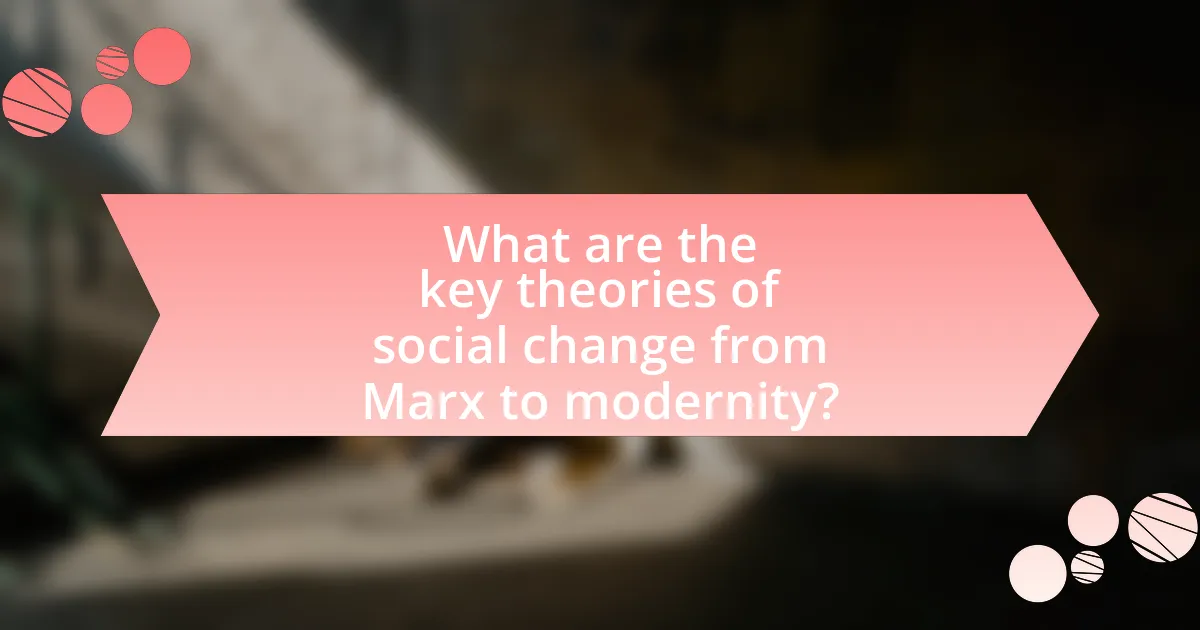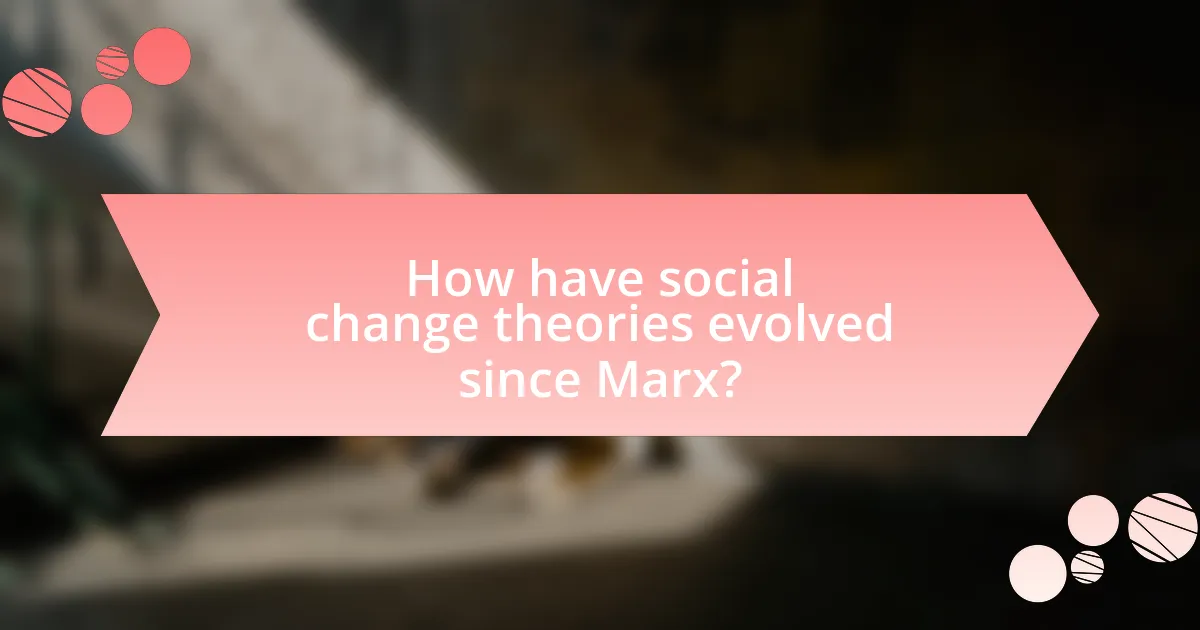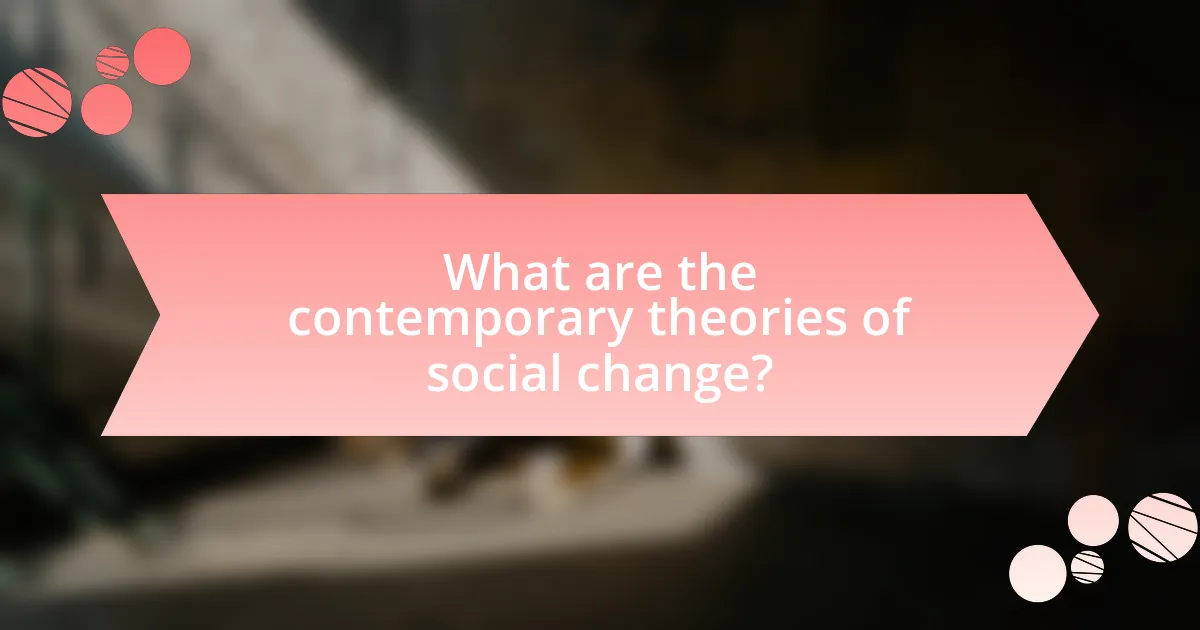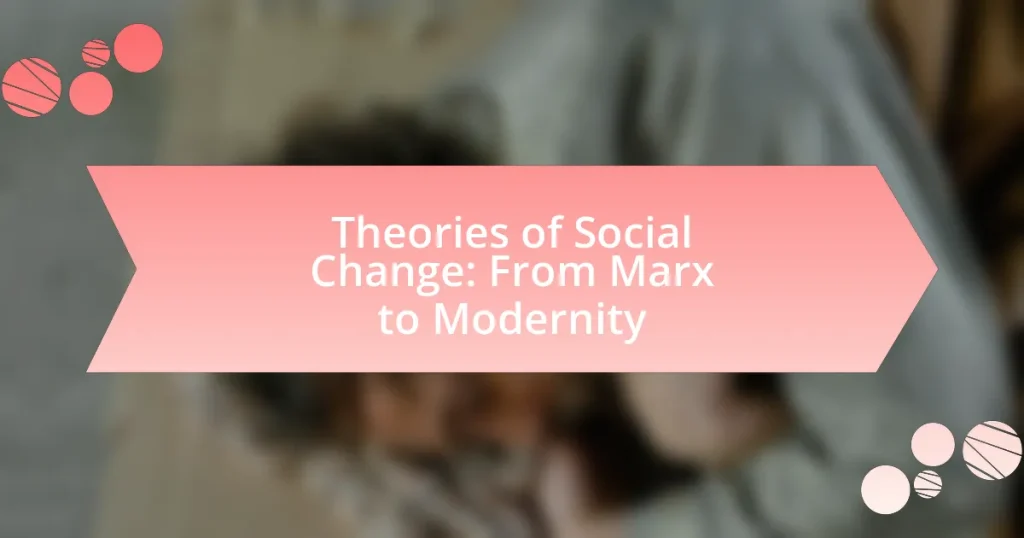The article examines key theories of social change from Karl Marx to contemporary perspectives, highlighting the evolution of thought regarding societal transformation. It discusses Marx’s historical materialism and class struggle as foundational concepts, followed by critiques and alternative theories such as functionalism, conflict theory, and postmodernism. The impact of globalization, technology, and cultural shifts on social change is also explored, along with the role of social movements in driving transformation. The article concludes by offering practical insights for policymakers and activists based on these theories, emphasizing the importance of understanding the complex dynamics of social change in modern society.

What are the key theories of social change from Marx to modernity?
Key theories of social change from Marx to modernity include Marx’s historical materialism, which posits that economic structures drive societal change, and the conflict between classes as a catalyst for transformation. Following Marx, the Chicago School emphasized urbanization and social disorganization as factors influencing social change, while Talcott Parsons introduced the concept of functionalism, suggesting that social systems evolve to maintain stability. In contrast, postmodern theorists argue that social change is characterized by fragmentation and diversity, reflecting the complexities of contemporary society. These theories collectively illustrate the evolution of thought regarding the mechanisms and drivers of social change from the 19th century to modern times.
How did Karl Marx’s theories influence social change?
Karl Marx’s theories significantly influenced social change by providing a framework for understanding class struggle and the dynamics of capitalism. His analysis of capitalism highlighted the exploitation of the working class by the bourgeoisie, which galvanized labor movements and inspired revolutions, such as the Russian Revolution of 1917. Marx’s ideas led to the establishment of socialist and communist movements worldwide, advocating for workers’ rights and social equity. The impact of his theories is evident in the formation of labor unions and the implementation of social policies aimed at reducing inequality, such as welfare programs and labor laws in various countries.
What are the main components of Marx’s theory of historical materialism?
Marx’s theory of historical materialism comprises several main components: the material conditions of society, the mode of production, class struggle, and the superstructure. The material conditions of society refer to the economic base that shapes social relations and institutions. The mode of production, which includes the forces and relations of production, determines how goods are produced and distributed. Class struggle arises from the conflicts between different social classes, primarily between the bourgeoisie and the proletariat, driving historical change. Lastly, the superstructure encompasses the cultural, political, and ideological aspects of society that are influenced by the economic base. These components collectively illustrate how material conditions and economic factors shape societal development and historical progress.
How does class struggle play a role in Marx’s view of social change?
Class struggle is central to Marx’s view of social change, as he posits that the conflict between different social classes drives historical development. According to Marx, society is fundamentally divided into the bourgeoisie, who own the means of production, and the proletariat, who sell their labor. This inherent conflict leads to revolutionary change when the proletariat rises against the bourgeoisie, ultimately resulting in the establishment of a classless society. Historical evidence, such as the Industrial Revolution, illustrates how class tensions can lead to significant social transformations, validating Marx’s assertion that class struggle is a primary engine of social change.
What critiques have emerged against Marx’s theories of social change?
Critiques against Marx’s theories of social change primarily focus on his deterministic view of history, economic reductionism, and neglect of non-economic factors. Critics argue that Marx’s historical materialism oversimplifies complex social dynamics by attributing societal changes predominantly to economic forces, as seen in the transition from feudalism to capitalism. Additionally, scholars like Max Weber have highlighted the importance of cultural and ideological factors, suggesting that Marx’s framework fails to account for the role of ideas and values in shaping social change. Furthermore, the failure of Marxist-inspired regimes to achieve the predicted proletarian revolution has led to skepticism about the applicability of his theories in contemporary contexts.
How do contemporary theorists challenge Marx’s ideas?
Contemporary theorists challenge Marx’s ideas by emphasizing the role of culture, identity, and globalization in social change, rather than solely focusing on class struggle and economic factors. For instance, theorists like Antonio Gramsci introduced the concept of cultural hegemony, arguing that power is maintained through cultural institutions and ideologies, not just economic control. Additionally, postmodern theorists critique Marx’s deterministic view of history, suggesting that social change is more complex and influenced by multiple factors, including technology and individual agency. This perspective is supported by empirical studies showing that social movements often arise from cultural and identity-based grievances, rather than purely economic conditions, indicating a shift in the understanding of social dynamics beyond Marx’s original framework.
What alternative perspectives on social change have been proposed?
Alternative perspectives on social change include structural functionalism, which views society as a complex system whose parts work together to promote stability; conflict theory, which emphasizes the role of power struggles and inequality in driving change; and symbolic interactionism, which focuses on the meanings and interpretations individuals attach to social phenomena. Each perspective offers a distinct lens through which to analyze the dynamics of social change, highlighting different factors such as social structures, power relations, and individual agency. For instance, structural functionalism, as articulated by Talcott Parsons, posits that social change occurs gradually as societies adapt to new challenges, while conflict theory, rooted in the works of Karl Marx, argues that change is often the result of conflicts between competing interests.

How have social change theories evolved since Marx?
Social change theories have evolved significantly since Marx, transitioning from a focus on class struggle and economic factors to a more multifaceted understanding that includes cultural, political, and technological dimensions. While Marx emphasized the role of economic structures and class conflict as primary drivers of social change, subsequent theorists like Max Weber introduced the importance of ideas and values, highlighting how cultural factors influence social dynamics. Additionally, the emergence of postmodern theories has further diversified the discourse, incorporating perspectives on identity, globalization, and social movements, as seen in the works of theorists like Michel Foucault and Judith Butler. This evolution reflects a shift towards recognizing the complexity of social change, where multiple factors interact rather than a singular economic determinant.
What are the major sociological theories of social change in the 20th century?
The major sociological theories of social change in the 20th century include Marxism, Functionalism, and Symbolic Interactionism. Marxism, founded by Karl Marx, posits that social change is driven by class struggle and economic factors, emphasizing the conflict between the bourgeoisie and proletariat as a catalyst for societal transformation. Functionalism, associated with theorists like Talcott Parsons, views social change as a gradual process that maintains social stability and equilibrium, where each part of society contributes to the whole. Symbolic Interactionism, led by figures such as George Herbert Mead, focuses on the micro-level interactions and meanings individuals attach to their experiences, suggesting that social change occurs through the reinterpretation of symbols and social interactions. These theories collectively illustrate the diverse perspectives on how and why societies evolve over time.
How does functionalism explain social change?
Functionalism explains social change as a process that occurs when the various parts of society adapt to maintain stability and equilibrium. According to functionalist theory, social institutions and structures evolve in response to changes in the environment, such as technological advancements or shifts in cultural values. For instance, Emile Durkheim, a key figure in functionalism, argued that as societies progress, they transition from mechanical solidarity, where individuals are connected through similarities, to organic solidarity, where individuals are interdependent due to specialized roles. This transition illustrates how functionalism views social change as a necessary adaptation to ensure the continued functioning of society.
What role does conflict theory play in understanding social change?
Conflict theory plays a crucial role in understanding social change by highlighting how power disparities and social inequalities drive societal transformations. This theory, rooted in the works of Karl Marx, posits that social change occurs primarily through the conflict between different social classes, where the oppressed challenge the status quo to achieve equity. Historical examples, such as the labor movements in the late 19th and early 20th centuries, illustrate how workers organized against capitalist exploitation, leading to significant reforms in labor rights and social policies. Thus, conflict theory provides a framework for analyzing how struggles for power and resources can catalyze profound changes in societal structures and norms.
What impact did globalization have on theories of social change?
Globalization significantly influenced theories of social change by introducing a framework that emphasizes interconnectedness and the rapid exchange of ideas, cultures, and economic practices across borders. This shift has led to the recognition that social change is no longer confined to local or national contexts but is increasingly shaped by global dynamics. For instance, the rise of transnational movements and the spread of technology have altered traditional social structures and relationships, prompting theorists to adapt existing models, such as those proposed by Marx, to account for these new realities. Additionally, globalization has facilitated the emergence of hybrid identities and cultural exchanges, challenging the notion of fixed social categories and prompting scholars to explore the complexities of identity formation in a globalized world.
How has technology influenced modern theories of social change?
Technology has significantly influenced modern theories of social change by acting as a catalyst for transformation in social structures and interactions. The advent of the internet and digital communication has reshaped how individuals and communities engage, leading to new forms of social organization and activism. For instance, social media platforms have enabled grassroots movements, such as the Arab Spring, demonstrating how technology can mobilize collective action and challenge existing power dynamics. Additionally, technological advancements in transportation and communication have accelerated globalization, altering economic and cultural exchanges, which are central themes in contemporary social change theories. These developments underscore the critical role of technology in shaping societal norms, values, and institutions, thereby validating its influence on modern theories of social change.
What are the implications of cultural shifts on social change theories?
Cultural shifts significantly influence social change theories by altering the frameworks through which societies understand and enact change. For instance, the transition from industrial to post-industrial societies has led to a reevaluation of Marxist theories, which primarily focused on class struggle and economic factors. In contemporary contexts, cultural elements such as identity, technology, and globalization have become central to understanding social dynamics. Research by Inglehart and Baker (2000) in “Modernization, Cultural Change, and Democracy: The Human Development Sequence” illustrates that as societies become more economically developed, their values shift towards self-expression and individualism, impacting social movements and collective actions. This indicates that social change theories must adapt to incorporate these cultural dimensions to remain relevant and effective in explaining societal transformations.

What are the contemporary theories of social change?
Contemporary theories of social change include modernization theory, dependency theory, world-systems theory, and social constructivism. Modernization theory posits that societies progress through stages of development, often influenced by technological advancements and economic growth. Dependency theory argues that the economic development of some countries is hindered by their dependence on wealthier nations, creating a cycle of poverty. World-systems theory, developed by Immanuel Wallerstein, emphasizes the global economic system’s role in shaping social structures, highlighting the interconnectedness of nations. Social constructivism focuses on how social realities are constructed through interactions and shared meanings, suggesting that change occurs through shifts in collective perceptions. These theories are supported by various empirical studies and historical analyses that illustrate their relevance in understanding social dynamics in the contemporary world.
How do postmodern theories approach social change?
Postmodern theories approach social change by emphasizing the fluidity of identities, the multiplicity of truths, and the rejection of grand narratives. These theories argue that social change is not linear or predictable but rather shaped by diverse perspectives and local contexts. For instance, Jean-François Lyotard’s concept of the “incredulity towards metanarratives” highlights how dominant ideologies are questioned, leading to fragmented social movements that reflect varied experiences and realities. This perspective is supported by the observation that social movements today often arise from specific cultural contexts rather than overarching ideological frameworks, illustrating the postmodern view that social change is complex and decentralized.
What are the key characteristics of postmodern social change theories?
Postmodern social change theories are characterized by their skepticism towards grand narratives and ideologies, emphasizing the fragmented and subjective nature of social reality. These theories reject the idea of a single, linear progression of history, instead proposing that social change is influenced by diverse perspectives and cultural contexts. They highlight the role of language, discourse, and power relations in shaping social identities and experiences, as seen in the works of theorists like Michel Foucault and Jean-François Lyotard. Additionally, postmodern theories focus on the impact of globalization and technology on social structures, illustrating how these factors contribute to the complexity and multiplicity of social change in contemporary society.
How do postmodern theorists critique earlier theories of social change?
Postmodern theorists critique earlier theories of social change by arguing that these theories, such as Marxism and modernization theory, oversimplify complex social dynamics and ignore the multiplicity of identities and experiences. They contend that earlier frameworks often rely on grand narratives that claim to explain social progress in linear terms, which fails to account for the fragmented and diverse nature of contemporary society. For instance, postmodern theorists like Jean-François Lyotard emphasize the importance of localized narratives and the plurality of perspectives, suggesting that social change cannot be understood through a single lens. This critique is supported by the observation that social movements today are often decentralized and driven by various cultural, social, and political factors, rather than a unified ideology or goal.
What role do social movements play in contemporary theories of social change?
Social movements are central to contemporary theories of social change as they act as catalysts for societal transformation and challenge existing power structures. These movements mobilize collective action, raise awareness about social injustices, and advocate for policy changes, thereby influencing public discourse and political agendas. For instance, the Civil Rights Movement in the United States significantly altered legislation and societal attitudes towards racial equality, demonstrating how organized efforts can lead to substantial social reform. Additionally, contemporary theories, such as those proposed by scholars like Charles Tilly, emphasize the importance of social movements in shaping political opportunities and framing issues, further validating their critical role in driving social change.
How do grassroots movements influence social change today?
Grassroots movements influence social change today by mobilizing communities to advocate for policy reforms and social justice. These movements leverage social media and local organizing to raise awareness and build coalitions, effectively amplifying marginalized voices. For instance, the Black Lives Matter movement has significantly impacted public discourse and policy regarding racial inequality, leading to legislative changes in various jurisdictions. Research indicates that grassroots activism can lead to increased civic engagement, as seen in the rise of voter turnout in areas where such movements are active. This demonstrates that grassroots efforts are crucial in shaping societal norms and influencing institutional responses to social issues.
What are the challenges faced by modern social movements in effecting change?
Modern social movements face several challenges in effecting change, including fragmentation, digital misinformation, and institutional resistance. Fragmentation occurs as diverse groups within a movement may have differing goals, leading to a lack of unified action. Digital misinformation complicates communication and can undermine public support, as seen in movements like Black Lives Matter, where false narratives spread rapidly online. Institutional resistance is evident when established political and social systems actively oppose or co-opt movements, as demonstrated by the backlash against climate activism in various countries. These challenges hinder the effectiveness of social movements in achieving their objectives.
What practical insights can be drawn from theories of social change?
Theories of social change provide practical insights into understanding societal dynamics and guiding effective interventions. For instance, Marx’s theory emphasizes the role of class struggle in driving social transformation, suggesting that addressing economic inequalities can lead to significant societal shifts. Additionally, modern theories, such as those by Anthony Giddens, highlight the importance of agency and structure, indicating that individual actions can collectively influence social change. These insights can inform policymakers and activists in designing strategies that leverage both structural conditions and individual behaviors to foster social progress.
How can understanding social change theories inform policy-making?
Understanding social change theories can significantly inform policy-making by providing frameworks that explain how societal transformations occur and the factors driving these changes. For instance, theories such as Marxism highlight the role of economic structures and class struggles in shaping social dynamics, which can guide policymakers in addressing inequalities and implementing reforms that promote social justice. Additionally, modern theories like the diffusion of innovations illustrate how new ideas and technologies spread within societies, enabling policymakers to design effective communication strategies that facilitate the adoption of beneficial practices. Empirical evidence supports these theories; for example, studies have shown that policies informed by social change theories can lead to more effective interventions in areas such as education and public health, as they align with the underlying social contexts and behaviors of the target populations.
What strategies can activists use to leverage theories of social change effectively?
Activists can leverage theories of social change effectively by employing strategies such as grassroots mobilization, coalition-building, and utilizing digital platforms for awareness and engagement. Grassroots mobilization allows activists to connect with local communities, fostering a sense of ownership and participation in social movements, which is supported by the success of movements like the Civil Rights Movement in the United States. Coalition-building enhances the impact of activism by uniting diverse groups with shared goals, as seen in the environmental movement where various organizations collaborate to address climate change. Additionally, utilizing digital platforms enables activists to reach wider audiences, organize events, and disseminate information rapidly, exemplified by the global reach of the #MeToo movement, which effectively raised awareness about sexual harassment and assault. These strategies align with social change theories that emphasize collective action and the importance of communication in mobilizing support for social justice initiatives.
